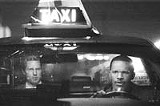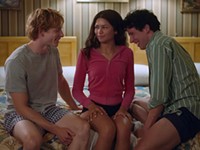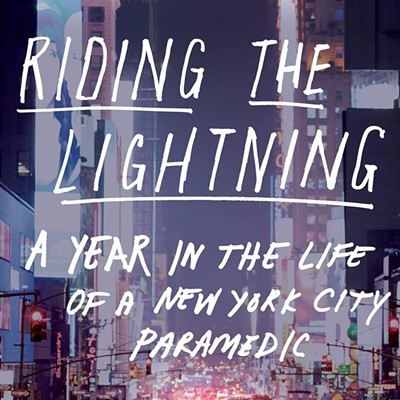[
{
"name": "500x250 Ad",
"insertPoint": "5",
"component": "15667920",
"parentWrapperClass": "",
"requiredCountToDisplay": "1"
}
]
The major publicity approach to the new Michael Mann film revolves around the fact that in Collateral Tom Cruise, his trim beard and hair dyed gray, undertakes a role very different from most of his previous star turns.
In a departure from such previous work as the engaging title character of Jerry Maguire, the action hero of Mission: Impossible, the passive protagonist of the agonizingly pretentious Eyes Wide Shut, or the rich wastrel of the bizarre and puzzling Vanilla Sky, Cruise plays a cold-blooded contract killer named Vincent, not only a bad guy, but a very bad guy, who pursues a sort of murder marathon throughout the picture. The movie and the character allow Cruise to display some relatively unexplored areas and possibilities of his screen persona, to transform the bland, handsome leading man into a real actor.
Employing a constant rhythmic crosscutting, the director demonstrates the working out of a dark and curious destiny in the relationship of Cruise's character and Max (Jamie Foxx), the cab driver he engages to transport him around Los Angeles for his night of mayhem. The random intervention of chance initially brings them together, but a sort of fate governs their subsequent actions.
Vincent simply happens to take Max's cab from the airport and, impressed by its cleanliness and Max's knowledge of the city --- one professional respecting another --- offers him a nice bundle of money to engage him for the night, so that he can, as he says, pay a visit to five friends; after that, all hell breaks loose.
While Max sits in his taxi waiting for Vincent at the first stop, a dead body, Vincent's handiwork, crashes onto his windshield; the horrified driver naturally wants out of the job, but Vincent's pistol persuades him to continue. After that shock, Max must witness and, albeit unwillingly, assist in the series of homicides, which incidentally lead to several more killings than the original contract stipulated. All the while, during the strange nocturnal odyssey, the two men discuss their differences, especially Max's natural distaste for Vincent's profession, and the killer's icy neutrality toward his work and his victims.
As they traverse the city, encountering more mishaps and dangers than they expected, the two men also forge something resembling a connection, almost a bizarre kind of friendship, despite the chasm of belief and behavior that separates them. When Vincent forces Max to confront a drug dealer, he effectively impersonates a tough and dangerous gunman himself, managing to escape harm and even inspire some fear and respect in the dealer and his thugs. At the same time, despite his chilly nihilism, now and then Vincent betrays a touch of introspection, even melancholy, sensing perhaps other possibilities beyond the negative act of his cold, efficient killing.
The temporary swap of personalities culminates in the most skillful sequence in a movie that depends heavily on slick and exciting camera work. Max enters a crowded nightclub, with the usual dancers bouncing all over the place, to confront another of Vincent's prospective victims; Vincent follows him, while the police, the FBI, and the thugs attempt to capture and/or kill one or another of the men.
The camera catches the confusion and danger, moving through the crowd of dancers, following the separate patterns of all the pursuers and their quarry, keeping the action tense with quick cuts and tight closeups, a terrific sequence in an extremely well-made motion picture.
Despite the element of randomness that initiates and frequently impedes the action, Collateral finally comes full circle, fulfilling a kind of promise that Vincent unknowingly utters at the beginning. The concluding sequence implies that destiny rather than chance governs the universe of the film, that the choices a character makes may ultimately follow an unexpected pattern with unpredicted consequences through the operation of some external force. Throughout the movie Vincent lectures Max about his own belief in the meaninglessness of any individual life and the necessity of defining oneself through action, a combination of nihilism and existentialism that Max cannot accept; at the end he learns a lesson different from the one he preaches.
Tom Cruise delivers the crisp, smart dialogue with an offhand casualness that indicates the cold, wised-up competence of his character. His good looks, diminutive stature, and sharp clothing actually place him in the great tradition of American movie gangsters --- small, dapper, precise, and vicious men who charm and attract at the same time they commit the acts of a psychopath. It is no mean achievement, and Tom Cruise carries it off.
Collateral, starring Tom Cruise, Jamie Foxx, JadaPinkett Smith, Mark Ruffalo, Peter Berg, Bruce McGill, Irma P. Hall, Barry Shabaka Henley, James Bardam; written by Stuart Beattie; directed by Michael Mann. CinemarkTinseltown; Loews Webster; Pittsford Plaza Cinema; Regal Culver Ridge; Regal Greece Ridge; Regal Henrietta.
Speaking of...
-
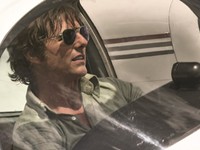
Film review: 'American Made'
Oct 3, 2017 -

Film review: 'The Mummy'
Jun 9, 2017 -
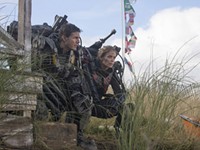
"Edge of Tomorrow"
Jun 11, 2014 - More »
Latest in Movie Reviews
More by George Grella
-

Film Review: "Cake"
Jan 26, 2015 -

Film Review: "American Sniper"
Jan 19, 2015 -

Film Review: "Inherent Vice"
Jan 12, 2015 - More »
